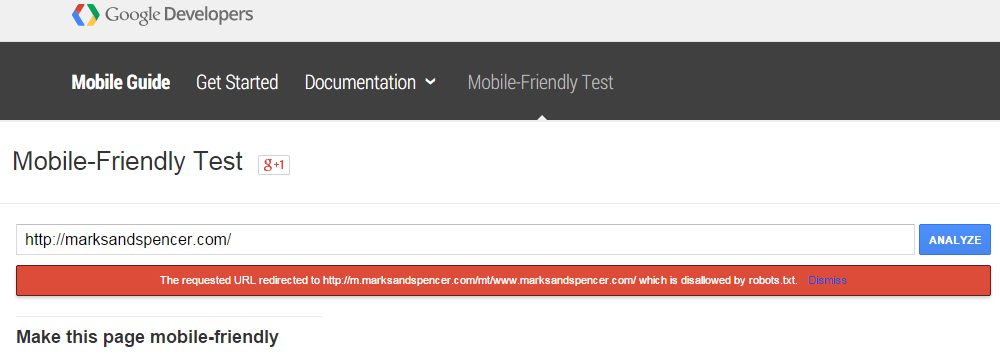The changes mean the company will now boost sites that display well on mobile devices in mobile search results, and downgrade those that do not.
The tweaks mark the biggest change to Google’s algorithm since Panda and Penguin, which respectively judged sites according to quality and linking practices.
The company warned the latest update would have a "significant impact" on rankings, leading some search experts to refer to the changes as "mobilegeddon".
Nick Fettiplace, SEO expert at Jellyfish, warned: "Advertisers whose websites do not cater for mobile may start to see fluctuations in their organic performance as soon as April 21st, when the roll-out of the new algorithm begins."
Argos passes, M&S fails
Google has built an online test for brands and publishers to check whether their sites qualify as mobile-friendly.
Major brands including Argos, Tesco, Aldi and Morrisons all pass, while Marks and Spencer failed.
According to Darryl Adie, managing director of retail tech firm Ampersand, this boils down to M&S using separate URLs for its mobile and desktop sites, and failing to flag the relationship in the code.
He said: "It's hard to say exactly when it will begin to effect M&S' mobile rankings, but it will if the retailer does not address this soon."
Mobile is becoming increasingly important for brands, with data from IMRG and Capgemini showing that mobile accounted for 40% of all UK online retail sales in Q4 last year. These figures include sales from apps as well as mobile sites.
Mark Steel, digital operations director for Argos, noted the importance of mobile for the business.
He told Marketing: "Mobile is already a really important part of our overall revenue mix with over 28% of total sales coming from mobile channels during our recent Christmas trading period, and this continues to grow as more of our customers are shopping with us using mobile devices."
He added that the company had redesigned its homepage on mobile in recent months and overhauled the check-out experience to make the site easier to navigate on different devices.
He said the company expected its mobile site to continue to "perform well" after Google’s changes.
Importance of mobile
According to Google, half of all searches globally come from mobile – yet many brands have failed to keep up with the shift in consumer behaviour.
A report from the IAB last year found that most big UK brands have a mobile presence, but a significant number across travel, FMCG, retail and finance do not.
Lukasz Zelezny, head of SEO at uSwitch, said the changes would push brands to build a better experience for customers.
He told Marketing: "It is very likely that, going forward, a responsive design will become a standard solution in business.
"That will be a good thing as a responsive design for mobile handsets and tablets is something that massively improves user experience.
He added: "You may or may not like Google’s requirements but from a wider perspective, Google and the websites who rely on it play on the same team [and care] about the same customers."
(This article first appeared on Marketingmagazine.co.uk)





